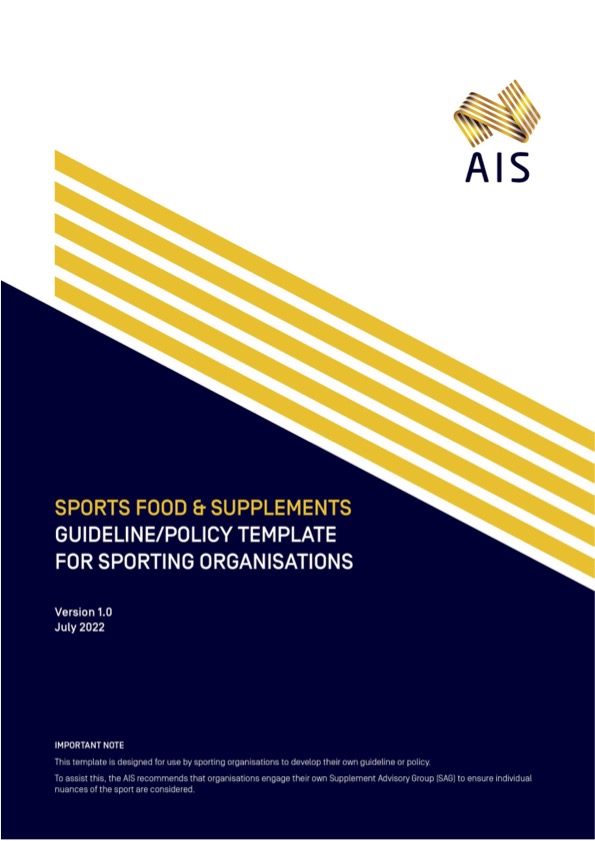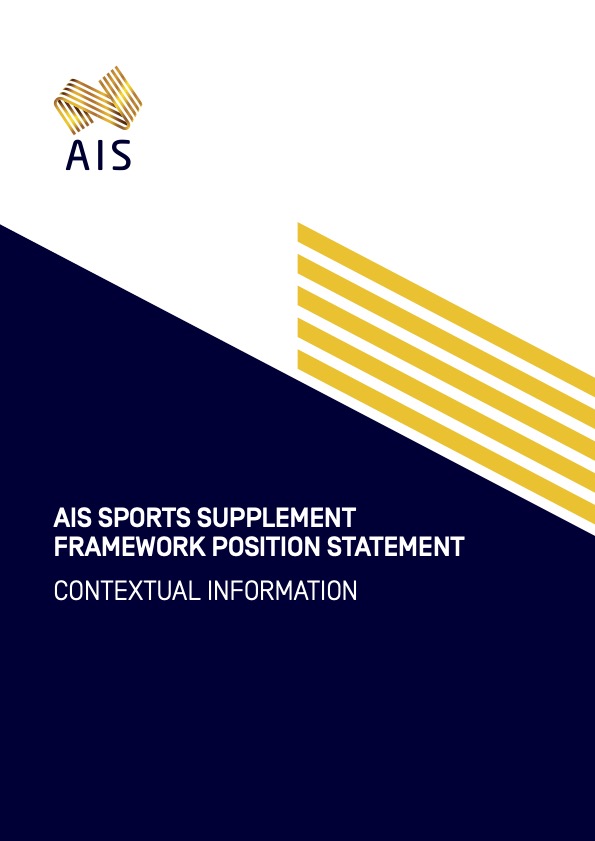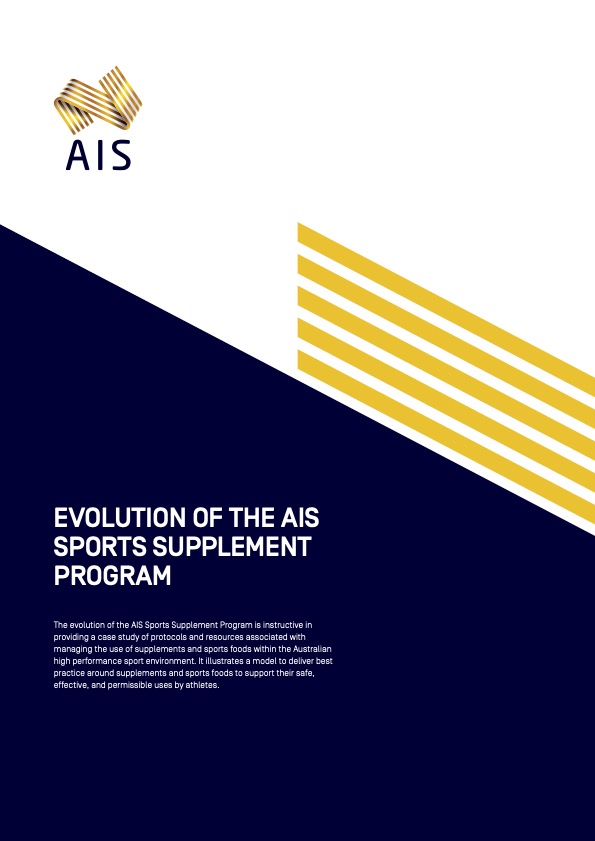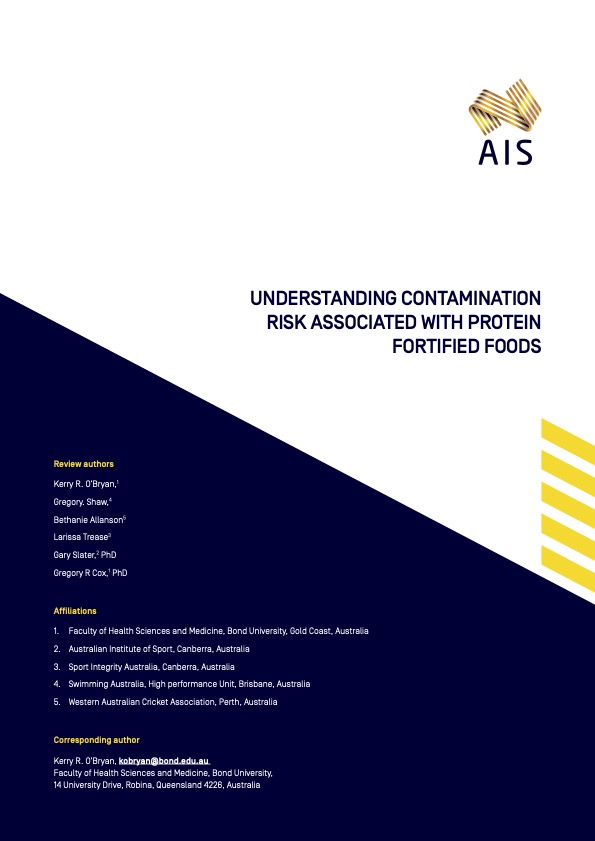Sports Food and Supplements Guidelines Policy Template for Sport

This resource is designed to assist sporting organisations to develop and implement their own guideline/policy. It becomes a framework to address an evidence based, pragmatic approach to supplement use in elite athletes who compete in sports that require compliance with the World Anti-Doping Agency (WADA) list of prohibited substances and methods.
AIS Sports Supplement Framework Position Statement Contextual Information

This Position Statement outlines the principles and implementation of evidence-based use of supplements and sports foods in sport, with a focus on features and requirements of the Australian HP sports system, drawing on the expertise derived from the activities of the AIS Framework group and the IOC Working Group on Dietary Supplements.
Evolution of The AIS Sports Supplement Program

The evolution of the AIS Sports Supplement Program is instructive in providing a case study of protocols and resources associated with managing the use of supplements and sports foods within the Australian high performance sport environment. It illustrates a model to deliver best practice around supplements and sports foods to support their safe, effective, and permissible uses by athletes.
Understanding contamination risk associated with protein fortified foods: Report

The fortification of foods with additional protein is an increasing trend within food industry across a wide range of foods, from breakfast cereals and bars to flavoured milks. The doping risk profile associated with these foods is confusing for both athletes and performance nutrition practitioners. As such, we commissioned an investigation by a group of sports dietitians to better understand this risk. This report summarises the learnings from this detailed investigation.
Supplement Reclassification Form
The classification of supplement ingredients and sports foods is made via consideration of the AIS Sports Supplement Framework Committee and evolves according to new knowledge plus the informed direction of our key stakeholders. The Framework Committee meet on a quarterly basis to review applications for consideration of addition/alteration of specific supplement ingredients.
Applications can be made by relevant members (including consultants, where appropriate) of Performance Support teams within the National Institute Network (NIN) or National Sporting Organisations (NSO) within Australia. To submit an application for consideration of the addition or reclassification of a substance use the Supplement Reclassification Form.
IOC consensus statement
The 2018 consensus statement on supplements and the high-performance athlete by the International Olympic Committee (IOC) provides a summary of the challenges faced by the high performance athletes, coaches and support staff when considering the use of supplements.
Maughan RJ, Burke LM, Dvorak J, Larson-Meyer DE, Peeling P, Phillips SM, Rawson ES, Walsh NP, Garthe I, Geyer H, Meeusen R, van Loon LJC, Shirreffs SM, Spriet LL, Stuart M, Vernec A, Currell K, Ali VM, Budgett RG, Ljungqvist A, Mountjoy M, Pitsiladis YP, Soligard T, Erdener U, Engebretsen L.
Br J Sports Med. 2018 ;52(7):439-455. doi: 10.1136/bjsports-2018-099027
Nutrition usually makes a small but potentially valuable contribution to successful performance in elite athletes, and dietary supplements can make a minor contribution to this nutrition programme. Nonetheless, supplement use is widespread at all levels of sport. Products described as supplements target different issues, including (1) the management of micronutrient deficiencies, (2) supply of convenient forms of energy and macronutrients, and (3) provision of direct benefits to performance or (4) indirect benefits such as supporting intense training regimens. The appropriate use of some supplements can benefit the athlete, but others may harm the athlete's health, performance, and/or livelihood and reputation (if an anti-doping rule violation results). A complete nutritional assessment should be undertaken before decisions regarding supplement use are made. Supplements claiming to directly or indirectly enhance performance are typically the largest group of products marketed to athletes, but only a few (including caffeine, creatine, specific buffering agents and nitrate) have good evidence of benefits. However, responses are affected by the scenario of use and may vary widely between individuals because of factors that include genetics, the microbiome and habitual diet. Supplements intended to enhance performance should be thoroughly trialled in training or simulated competition before being used in competition. Inadvertent ingestion of substances prohibited under the anti-doping codes that govern elite sport is a known risk of taking some supplements. Protection of the athlete's health and awareness of the potential for harm must be paramount; expert professional opinion and assistance is strongly advised before an athlete embarks on supplement use.





